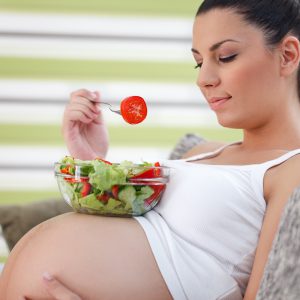
Regardless of the type of diet you follow, knowing what to eat for your best health when you’re pregnant can be challenging, so we have a few simple facts to help you during this special time.
During pregnancy, there is never a more important time to focus on nutrition! If you’re vegan, there are a few key things you should focus on to make sure you’re consuming the right foods for nourishment. After all, your nutritional status and what you eat during pregnancy has a direct impact on your pregnancy outcome and the quality of your breastmilk to come.
Pregnancy is a time where your body and its growing baby has special nutritional needs. If you’re a vegan mother-to-be, there are some things you should know to help with safe pregnancy and to give birth to a strong healthy baby.
1. Increased Energy Needs
Without a doubt, every human knows that energy needs go up when you’re pregnant. Heck, we practically look forward to the free pass of “eating for two!” It’s uber important to know how many extra calories you need each trimester and if you are vegan, to know about the best ways to fill those calories so that you’re getting all the micronutrients your body needs. Although fulfillment through a few extra cookies each day would be kind of awesome, you want to make sure you’re packing in the nutrients not empty calories to grow that super baby!
The Institute of Medicine (IOM) recommends the following (1):
- 1st Trimester: +0 extra calories/day
- 2nd Trimester: +340 extra calories/day
- 3rd Trimester: +452 extra calories/day
Cookie jokes aside, your caloric needs increase because your body not only needs the extra energy but the extra micronutrients too (e.g. vitamins and minerals). Therefore, you want to focus your efforts on foods that contain abundant amounts of the nutrients as vegans tend to naturally be deficient (more on these nutrients in a bit).
Cookie jokes aside, your caloric needs increase because your body not only needs the extra energy but the extra micronutrients too (e.g. vitamins and minerals). Therefore, you want to focus your efforts on foods that contain abundant amounts of the nutrients as vegans tend to naturally be deficient (more on these nutrients in a bit).
2. Increased Protein Needs – how to get the recommended amounts
In 2007, an Expert Consultation of several international health organizations concluded the following protein needs per trimester (based on additional average weight gain of approximately 30 pounds throughout the entire pregnancy) (2):
- 1st Trimester: +1gm extra protein/day
- 2nd Trimester: +9gm extra protein/day
- 3rd Trimester: +31gm extra protein/day
Since plant-based foods are naturally low in protein, being a vegan can make it challenging to consume enough protein throughout the day. So how would these additional protein recommendations shake out for you personally? We’ll offer an example:
A 135lb woman with a normal BMI and healthy body fat percentage needs roughly…
| Trimester | Extra Protein Needed | Amount of Quinor Per Day to Fulfill EXTRA Protein Requirements | Total Daily Protein Needed | Amount of Quinoa Per Day to Fulfill TOTAL Protein Requirements |
| First | +1 gram | 1/2 Tablespoon | 55 grams | 6.75 – 7 Cups/day |
| Second | +9 grams | 1 Cup + 1 Tablespoon | 63 grams | 7.75 – 8 Cups/day |
| Third | +31 grams | 3.75 Cups | 85 grams | 10.5 – 11 Cups/day |
Can you tell we love quinoa?! Obviously, you wouldn’t be getting all that extra protein by eating massive amounts of quinoa. There are plenty of other vegan-friendly foods that contain protein, we used all quinoa in our example for simplicity’s sake to show you how to add it all up. For example, pea protein, edamame, and beans can provide extra protein and in smaller amounts.
3. Higher Micronutrient Needs than a Non-Vegan
There are certain micronutrients (iron, zinc, and calcium) which interact with other compounds that hinder their full absorption, like fiber, phytic and oxalic acids (8). This is of greater concern for a vegan because a vegan tends to consume a large portion of their diet in foods rich in “nutrient binders” such as grains and some types of vegetables (8). It is for this reason that a vegan pregnancy requires increased amounts of the micronutrients: iron, zinc, and calcium, to ensure adequate levels while your body undergoes increased metabolic demands. Read more about increased vegan micronutrient needs here.
4. Food Sources of Imperative Nutrients
Regardless of whether your belly is the new house to a growing baby, vegan diets tend to be low in several nutrients that are vital for maternal health and fetal development. Nutrients of concern are Iron, Zinc, Calcium, Vitamin B12, Vitamin D, and Omega 3-Fatty Acid (9).
Because it’s imperative you consume foods rich in sources of these nutrients we’ve made a brief list of the best vegan sources as a cheat-sheet guide for you…
| Iron | Cooked Soybeans, Blackstrap Molasses, Cooked Lentils, Cooked Spinach, Tofu, Cooked Chickpeas |
| Zinc | Cooked Oatmeal, Raw-firm Tofu, Dry Roasted Cashews, Almonds, Cooked Lentils |
| Calcium | Kale, Okra, Bok Choyu, Almonds, Broccoli, Watercress, Calcium-fortified Dairy Alternative products |
| Vitamin B12 | Fortified Breakfast Cereals, Fortified Soymilk Products, Fortified Tofu Products, Red Star Nutritional Yeast *At this time, there is insufficient evidence to support algae, seaweed, spirulina, and fermented soy products (miso and tempeh) as reliable B12 sources while pregnant (20) |
| Vitamin D | The Sun! Exposing skin that’s free of suntan lotion for 15-20 minutes each day should help you meet your needs. |
| Omega 3-Fatty Acids (EPA & DHA) | Flaxseed and Flaxseed Oil, Chia Seeds and Chia Seed Oil, Hemp Seed Oil, Walnuts, Beechnuts, Chia Seeds, Canola, Soy, Seaweed |
| Choline | Soymilk, Tofu, Edamame (soybeans), Cooked Quinoa |
5. Supplementing During Pregnancies
As mentioned by the Physicians Committee for Responsible Medicine, almost all doctors will recommend that women trying to conceive begin taking a prenatal vitamin that contains folic acid to prevent birth defects and ensure adequate micronutrient intake.
The consequences of micronutrient deficiency and corresponding adverse pregnancy outcomes are well established and well documented. Therefore, although “food first” is always a Registered Dietitians motto, it is imperative to supplement with a quality prenatal or multivitamin prior to, during, and after pregnancy. We recommend this for all pregnant women, meat-abstaining or not.
Best Vegetarian Supplements for Pre-conception and Pregnancy
This post contains an affiliate link. As an Amazon Associate, we earn from qualifying purchases.
Governing health bodies have recently made updates to the requirements of prenatal vitamins in areas such as choline and iodine. Unfortunately, most formulations by the supplement companies have not caught up to the recommendations. Because of this, we recommend very few actual “pre-natal vitamins” and instead offer suggestions of how to meet all your daily needs through various combinations…
- We recommend Garden of Life Organic Prenatal Multivitamin Supplement with Folate
- It’s high quality, provides 150 mcg of iodine, as well as 600 mcg of folate, which is roughly what should be in a prenatal without exceeding tolerable limits.
- You’ll also need to supplement the following:
- Daily dose of iron (around 10 mg)
- Daily dose of calcium (about 500 mg)
- Daily Choline (about 250-350 mg)
- Daily DHA/Omega-3 Fatty Acid (total DHA + EPA around 900-1000mg)
- Bluebonnet Multi ONE Multivitamin
- You’ll also need to supplement the following:
- Daily dose of iron (around 15-20 mg)
- Daily dose of calcium (500 mg)
- Daily Choline (about 250-350 mg)
- Daily DHA/Omega-3 Fatty Acid (total DHA + EPA around 900-1000mg)
- You’ll also need to supplement the following:
- Solgar Earth Source Multinutrient
- You’ll also need to supplement the following:
- Daily dose of iron (around 10 mg)
- Daily dose of calcium (about 500 mg)
- Daily Choline (about 250-350 mg)
- Daily DHA/Omega-3 Fatty Acid (total DHA + EPA around 900-1000mg)
- You’ll also need to supplement the following:
**Make sure to separate your calcium and iron supplement by at least two hours.
There’s no perfect vegetarian supplement out there that actually stands up to quality testing. We’ve put forth what we feel are the best vegetarian supplements to use during pregnancy to optimize you and the baby’s health. Something important to note, is that the above recommendations are suitable sources for vegetarians – as we cannot guarantee that all of the starting cultures for the vitamins and minerals do not include animal sourcing. Although controversial, it is our recommendation that vegan pregnancy is supplemented by the most bioavailable sources of nutrients – which sometimes comes from an animal source. Our number one priority for you is the health and safety of you and your future newborn. If you would like to guarantee that your supplement is completely animal-free – please contact the manufacturer for further details.
Now that you’re in the know about some of the most important dietary concerns regarding vegan pregnancy, you’ll be more equipped to kick back and enjoy the bliss of being an expecting mom!












